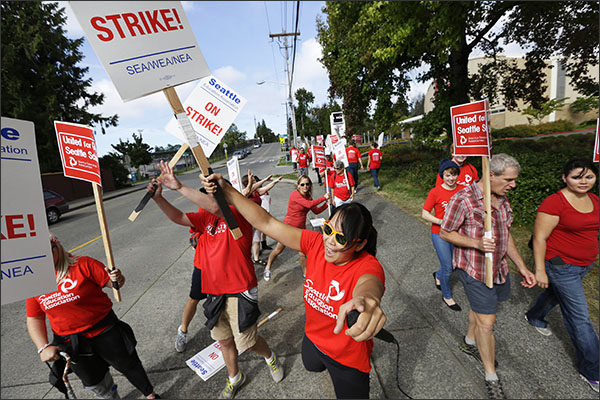Related Articles
Today The Seattle Times issued a strongly worded editorial urging lawmakers to reject a bill that would undo the protections guaranteed by the U.S. Supreme Court in the landmark Harris v. Quinn case. The Court’s decision in that case ended the practice of forcing individual providers (such as home health care providers), who are classified as state employees “solely for purpose of collective bargaining,” from being forced to pay for union representation they don’t want. The decision gave such “partial public employees” the right to choose.
Since that decision, thousands of individual providers in Washington have taken advantage of that right and opted to quit paying the union so they can keep more of their hard earned wages. Of course, every provider who makes that decision means less money in the union’s coffers.
Unions are nothing if not creative when it comes to ways to keep their union gravy train chugging along. Their latest scheme is a bill that would outsource the administration and management of the state’s 34,000 home care providers from the state Department of Social and Health Services (DSHS) to a private company.
SB 6199 would make home care providers the legal employees of those private companies, and in doing so would remove the protections granted by the Court in the Harris decision, which applies only to “partial public employees.” As employees of a private company, providers would have no longer have a choice whether they want to pay the union.
Worse, the scheme would cost the state $11 million more every year. As The Times points out, that is a significant amount of money that could be spent improving the services provided to the elderly, sick and disabled who rely on in home care.
As an ironic side note, the DSHS official who testified in favor of the bill said the outsourcing to private companies of the management of individual providers was necessary because the agency is overly burdened by the layers of new labor laws.
He complained that managing individual providers “has morphed” from a process where applicants filled out a one page document so the agency could verify the provider was above the age of 18 and had never been convicted of a crime, to what is now a time consuming process of dealing with labor management functions that are beyond the agency’s ability to now manage. He complained that the complex requirements to keep track of workers compensation, unemployment insurance, overtime, collective bargaining requirements such as seniority pay, paid leave, and the state’s new minimum wage and paid sick leave mandates were simply too burdensome for the agency. Of course, such ever-evolving regulations are the same complaints employers around the state have made for the last two decades; complaints which have routinely fallen on Democrat’s deaf ears.
The irony of DSHS making such complaints aside, the reality is SB 6199 has little to do with providing administrative relief to DSHS and everything to do with lawmakers pandering to what The Times calls “powerful special-interest groups.”
The Times effectively calls out DSHS on the flimsiness of their complaints and their request for lawmakers to pass SB 6199:
“…there should be ways to improve the organization’s productivity without a costly new layer of bureaucracy carrying a strong odor of political favoritism.”




